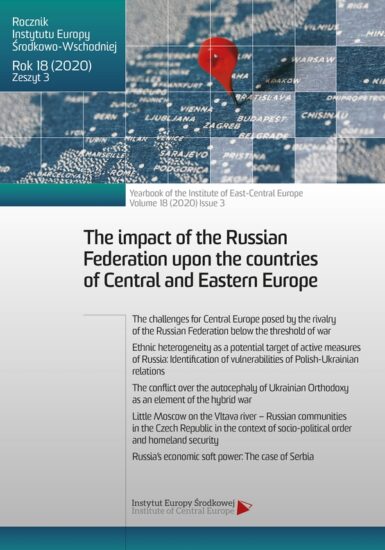ORCID: Wojciech Bednarek: 0000-0002-3061-8923
Afiliacja: Ministry of Foreign Affairs Republic of Poland
Strony: 73-92
Wydanie: Lublin 2020
DOI: https://doi.org/10.36874/RIESW.2020.3.4
Sposób cytowania: W. Bednarek, Little Moscow on the Vltava river – Russian communities in the Czech Republic in the context of socio-political order and homeland security, „Rocznik Instytutu Europy Środkowo-Wschodniej” 18(2020), z. 3, s. 73-92, DOI: https://doi.org/10.36874/RIESW.2020.3.4.
Słowa kluczowe: bezpieczeństwo, Czechy, Europa Centralna, migracja, Rosja
Abstrakt: The central concern of this paper is the growing influx of Russian migrants to the Czech Republic and the consequences for political and social order. With nearly 40,000 migrants, Russians are the fourth biggest foreign community in Czechia. Due to their material status, the history of bilateral relations, and the significant role of their homeland in Czech politics, the growing Russian community poses a problem for Czech society. The fear of Russian dominance – in political as well as economical dimensions – as well as resentment about the communistic era, is still present among Czech people. Although most Russians come to Czech to study or to do business and are not engaged in political activity, relations between migrants and the host society can be strained. Mutual prejudices make themselves felt in moments of the political crisis between two countries, such as the recent row over Soviet monuments in Prague. However, this doesn’t necessarily mean that the Russian community could easily become a tool for Kremlin propaganda. Russians appreciate the opportunity to live in a rich, liberal and democratic society and even though they keep strong emotional ties with their homeland they are not keen to affirm all of Moscow’s deeds.
Bibliografia:
Aleshkovsky, I., Grebenyuk, A., Vorobyeva, O., ‘The Evolution of Russian Emigration in the Post-Soviet Period’, Social Evolution & History, vol. 17, no. 2, 2018, https://www.sociostudies.org/upload/sociostudies.org/journal/seh/2018_2/140-155.pdf, https://doi.org/10.30884/seh/2018.02.09.
Bajda, P., ‘Are Czechs Russophiles’, The Warsaw Institute Review, no. 11, 2019/4, https://warsawinstitute.org/wp-content/uploads/2019/12/WIR_NO_11.pdf.
Baraniuk, K., ‘Mniejszości rosyjskojęzyczne w polityce zagranicznej Federacji Rosyjskiej – przykład Estonii’, Wschodnioznawstwo, no. 10, 2016.
Bornio, J., ‘Europa Środkowo-Wschodnia we współczesnych rosyjskich koncepcjach geopolitycznych’, Wschodnioznawstwo, no. 11, 2017.
Castles, S., Miller, M.J., Migracja we współczesnym świecie, Warszawa, 2011.
Centrum pro výzkum veřejného mínění, ‘Sympatie české veřejnosti k některým zemím – listopad 2019’, 13 December 2019, https://cvvm.soc.cas.cz/en/press-releases/political/international-relations/5074-czech-public-s-attitudes-to-foreign-countries-november-2019.
Ditrych, O., ‘Byle nie do kawiarni’, Nowa Europa Wschodnia, no. 5, 2015.
Dom v izgnanii: Ocherki o russkoj emigracii v Chehoslovakii 1918-1945, ed. M. Dobusheva, V. Krymova, Praga, 2008.
Janíčko, M., ‘Pražští Rusové’, Naše společnost. Časopis Centra pro výzkum veřejného mínění časopis Centra pro výzkum veřejného mínění Sociologického ústavu AV ČR, v.v.i, no. 10 (2), 2012.
Kozłowski, K., ‘Współczesne migracje jako źródło konfliktów politycznych’, in: Migracje międzynarodowe a modernizacja systemu politycznego i społecznego. Materiały z XIII Konferencji Naukowej Wydziału Dziennikarstwa i Nauk Politycznych Uniwersytetu Warszawskiego, 12 stycznia 2007, ed. G. Firlit-Fesnak, Warszawa, 2008.
Kupšovský, D., ‘Má soukromá rusofobie: Jak se naučit žít s ruskými imigranty v Praze?’, portal.rozhlas.cz, 6 October 2018, https://wave.rozhlas.cz/ma-soukroma-rusofobie-jak-se-naucit-zit-s-ruskymi-imigranty-v-praze-7633162.
Lazarová, D., Kukal, L., ‘Young Russians in Prague find that 1968 Russian-led invasion casts long shadow’, radio.cz, 13 August 2018, https://www.radio.cz/en/section/curraffrs/young-russians-in-prague-find-that-1968-russian-led-invasion-casts-long-shadow.
Mikule, M., ‘ “Putinovi emigrant” v Praze. Kdo jsou Rusové, kteří do Česka přišli z politických důvodů’, ct24.cz, 3 December 2018, https://ct24.ceskatelevize.cz/svet/2668793-putinovi-emigranti-v-praze-kdo-jsou-rusove-kteri-do-ceska-prisli-z-politickych-duvodu.
Orłowska, R., Uwarunkowania i skutki rozwoju migracji ekonomicznych w Unii Europejskiej w świetle wybranych teorii migracji międzynarodowych, Gdańsk, 2013.
Piotrowski, M., Raś, K., ‘Wzrost zagrożenia rosyjskiego w raportach bałtyckich służb specjalnych’, Biuletyn PISM, 15 July 2015, https://www.pism.pl/publikacje/Wzrost_zagro_enia_rosyjskiego_w_raportach_ba_tyckich_s_u_b_specjalnych.
Prague Security Studies Institute, ‘Summary of an Expert Roundtable Russian Influence in Central Europe’, 2015, http://www.pssi.cz/download/docs/402_russia-s-influence-tools-roundtable-summary-27-2-2017.pdf.
Prague Security Studies Institute, ‘United We Stand, Divided We Fall: The Kremlin’s Leverage in the Visegrad Countries. Executive Summary’, 2015, http://www.pssi.cz/download/docs/492_en-executive-summary.pdf.
Smolenova, I., ‘Russia’s Propaganda War’, Forbes, 25 March 2015, https://www.forbes.com/sites/realspin/2015/03/25/russias-propaganda-war/#4246ef345bf4.
Součková, K., ‘Historie se podle více než poloviny Čechů začíná falšovat. Vadí jim také rušení i stavění památníků’, irozhlas.cz, 3 February 2020, https://www.irozhlas.cz/zpravy-domov/pruzkum-historie-konev-vlasovci-pavel-novotny_2001030600_pj.
Strzelecki, J., ‘Painful Adaptation. The social consequences of the crisis in Russia’, OSW Studies, no. 60, 2017, https://www.osw.waw.pl/en/publikacje/osw-studies/2017-02-06/painful-adaptation-social-consequences-crisis-russia.
Tatarenko, A., ‘Demontaż pomnika marszałka Koniewa w Pradze: kryzys w relacjach czesko-rosyjskich’, Komentarze IEŚ, no. 166, 2020, https://ies.lublin.pl/komentarze/demontaz-pomnika-marszalka-koniewa-w-pradze-kryzys-w-relacjach-czesko-rosyjskich-166-69-2020.
Tatarenko, A., ‘Relikty komunizmu: polityka historyczna wobec materialnego dziedzictwa sowieckiego w Republice Czeskiej’, Prace IEŚ, no. 1, 2019, https://ies.lublin.pl/pub/publikacje/prace/ies-prace-1-1-2019.pdf.
The Security Information Service (BIS), ‘Annual Report of the Security Information Service for 2018’, 26 November 2019, https://www.bis.cz/annual-reports/annual-report-of-the-security-information-service-for-2018-0ee1b64b.html, https://doi.org/10.1016/s1363-4127(01)00305-3.
Vejvodová, P., Janda J., Víchová, V., The Russian connections of far-right and paramilitary organizations in the Czech Republic, Budapest, 2017, https://www.kremlinwatch.eu/userfiles/the-russian-connections-of-far-right-and-paramilitary-organizations-in-the-czech-republic_15273212518405.pdf.
Začlenění ruské komunity do většinové společnosti, ed. J. Vavrečková, K. Dobiášová, Prague, 2013, https://www.cizinci.cz/documents/551336/568661/Za%C4%8Dlen%C4%9Bn%C3%AD+rusk%C3%A9+komunity+do+v%C4%9Bt%C5%A1inov%C3%A9+spole%C4%8Dnosti+%282015%29.pdf/080a281c-d226-2c92-4657-d8e09720f953.
Słowa kluczowe: bezpieczeństwo, Czechy, Europa Centralna, migracja, Rosja
PDF: Pobierz